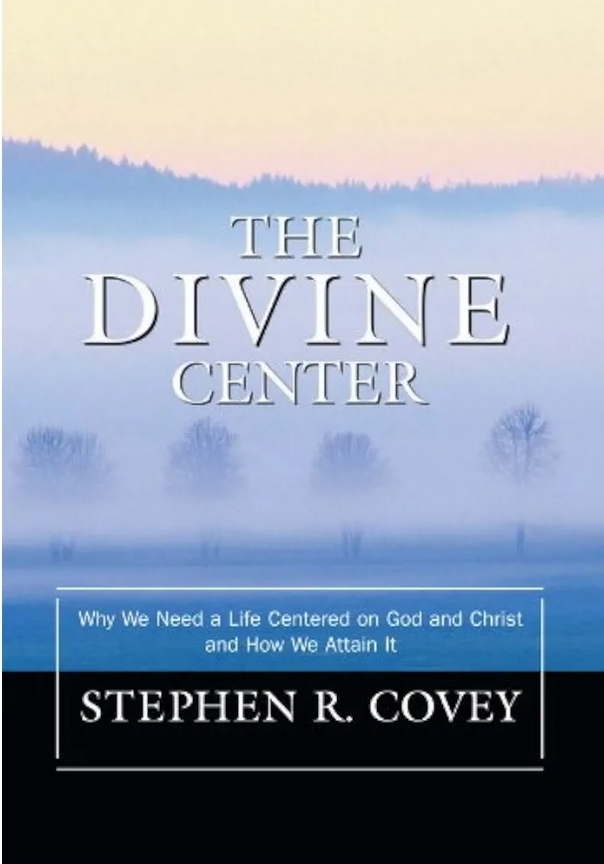Introduction to The Divine Center
The Divine Center by Stephen R. Covey, best known for his landmark book The 7 Habits of Highly Effective People, focuses on spiritual growth and aligning one’s life with divine principles. While Covey’s later works emphasize universal principles of effectiveness, The Divine Center is deeply rooted in Latter-day Saint (LDS) theology and teachings.
The book explores how individuals can center their lives around God rather than external influences like wealth, popularity, status, or materialism. Covey emphasizes that true fulfillment, peace, and success come from anchoring one’s life in divine principles and cultivating a spiritual foundation.
The Core Premise of The Divine Center
At its heart, The Divine Center proposes that:
- Everyone centers their lives on something—be it money, career, pleasure, family, self, or God.
- When God is at the center, clarity, purpose, and direction naturally follow.
- External and temporary sources of meaning (e.g., status, wealth, or appearances) lead to anxiety, insecurity, and dissatisfaction.
Covey challenges readers to evaluate their current center and shift it to a divine foundation through conscious choices and spiritual discipline.
Key Idea: “When your life is centered on God, every other aspect—relationships, work, and personal growth—aligns harmoniously.”
The Danger of False Centers
Covey identifies several false centers that people often rely on:
- Self-Centered Life: Driven by ego, pride, and self-interest.
- Spouse-Centered Life: Over-relying on a partner for validation and meaning.
- Family-Centered Life: When family becomes the sole purpose of life, leading to overattachment and imbalance.
- Money-Centered Life: The pursuit of wealth becomes the driving force.
- Work-Centered Life: Identity is solely tied to professional success.
- Pleasure-Centered Life: Chasing instant gratification at the cost of long-term fulfillment.
- Friendship-Centered Life: Overvaluing the opinions and approval of others.
- Enemy-Centered Life: Defining life through conflict or opposition to others.
- Church-Centered Life: Focusing on rituals, rules, and appearances rather than genuine spirituality.
Covey’s Solution: Replace these false centers with a Divine Center, where spiritual principles become the guiding light.
Characteristics of a Divine-Centered Life
Covey explains that a divine-centered life brings clarity, stability, and peace, even amidst life’s storms. Key characteristics include:
- Stability: Anchored in eternal principles rather than fleeting goals.
- Peace: An inner calm unaffected by external chaos.
- Perspective: The ability to see life’s challenges through a spiritual lens.
- Integrity: Consistency between beliefs, words, and actions.
- Resilience: The strength to face adversity without losing faith or direction.
Quote from the Book: “The closer we align our will with divine principles, the more power, clarity, and direction we gain in our lives.”
Aligning Life with Divine Principles
Covey emphasizes several principles for creating a Divine Center:
1. Faith in God
- Faith is the cornerstone of a divine-centered life.
- Trusting God means surrendering control and believing in His wisdom.
2. Daily Spiritual Practices
- Regular prayer, scripture study, and meditation are essential.
- Spiritual disciplines help keep God at the center of decision-making.
3. Obedience to Divine Laws
- True freedom comes from obedience to eternal laws.
- Living with integrity ensures alignment with divine will.
4. Service to Others
- Serving others reflects divine love and creates meaningful connections.
- Selflessness dissolves ego and reinforces a divine center.
5. Reflection and Accountability
- Regular self-assessment helps individuals stay aligned with their spiritual center.
- Accountability to God and oneself ensures consistent growth.
Practical Steps for Building a Divine Center
Covey provides actionable steps for shifting from a false center to a divine center:
- Identify Your Current Center: Reflect on what drives your decisions and actions.
- Prioritize Spiritual Practices: Make prayer, study, and reflection daily habits.
- Align Decisions with Eternal Principles: Evaluate choices based on long-term spiritual impact.
- Seek Inspiration: Trust in divine guidance when facing uncertainty.
- Cultivate Gratitude: Recognize blessings and express thankfulness regularly.
Faith, Family, and Country in the Context of The Divine Center
Faith:
- The foundation of a divine-centered life.
- Provides strength, courage, and clarity during adversity.
Family:
- Relationships rooted in divine principles foster love, unity, and support.
- Family serves as a reflection of one’s divine-centered values.
Country:
- Serving one’s community and country aligns with spiritual responsibility.
- A divine center encourages ethical leadership and civic responsibility.
Quote from Covey: “True fulfillment comes not from what we achieve, but from who we become as we center our lives on divine principles.”
The Impact of Misinformation, Indoctrination, and Propaganda
Covey warns against the distraction and distortion caused by misinformation and propaganda:
- Misinformation: Can misguide people from spiritual truths.
- Indoctrination: Creates rigid, unexamined beliefs.
- Propaganda: Manipulates emotions to serve external agendas.
Solution: By anchoring oneself in a Divine Center, individuals become resilient against manipulation and capable of discerning truth.
Why The Divine Center Matters Today
- In a world filled with distractions, fleeting goals, and shallow pursuits, the message of The Divine Center is more relevant than ever.
- Covey’s call to center life on eternal, unchanging principles serves as a guide for personal peace, resilience, and meaningful contributions to society.
Conclusion: Living a Divine-Centered Life
In The Divine Center, Stephen R. Covey provides a profound guide for shifting focus from temporary distractions to eternal truths. By centering one’s life on God and divine principles, individuals can:
- Overcome anxiety and confusion.
- Find inner peace and stability.
- Contribute meaningfully to their families, communities, and society.
Final Thought:
“When we center our lives on God, everything else falls into place—not without effort or challenges, but with clarity, courage, and divine strength.” – Stephen R. Covey






